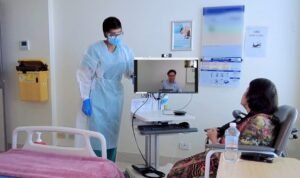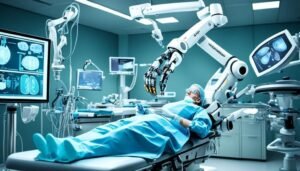In recent years, the integration of technology in healthcare has dramatically transformed the way hospitals operate, impacting patient care, administrative efficiency, and overall hospital management. Modern hospitals are embracing advanced technological tools to improve patient outcomes, streamline operations, and enhance the overall patient experience. From artificial intelligence (AI) to telemedicine, healthcare technology is reshaping the landscape of medical care. This article explores the various ways in which technology is playing a pivotal role in modern hospitals, offering new solutions to age-old problems, and improving the quality of care delivered.
1. Electronic Health Records (EHRs) and Data Management
One of the most significant technological advancements in hospitals is the implementation of Electronic Health Records (EHRs). EHRs are digital versions of a patient’s paper charts, which contain a comprehensive history of a patient’s health data, including medical history, allergies, medications, lab results, and diagnostic information. EHRs provide healthcare providers with real-time access to patient data, which is crucial for informed decision-making.
The integration of EHRs reduces the risk of medical errors, particularly those related to incorrect prescriptions or miscommunication between healthcare providers. Additionally, EHRs make it easier for hospitals to track patient outcomes over time, thus enabling improved long-term care. Moreover, the system enhances patient privacy by limiting access to sensitive information, ensuring data security through encryption and authentication protocols.
2. Artificial Intelligence (AI) and Machine Learning in Diagnostics
Artificial Intelligence (AI) is one of the most promising technologies revolutionizing modern healthcare. AI-powered tools are being used to assist doctors and medical professionals in diagnosing diseases with higher accuracy and speed. For example, AI algorithms can analyze medical imaging data, such as X-rays, CT scans, and MRIs, to detect early signs of diseases like cancer, pneumonia, or neurological disorders. AI tools like Deep Learning and Machine Learning (ML) can also analyze patient data to predict outcomes, personalize treatment plans, and assist in decision-making processes.
AI is also being employed to automate routine administrative tasks such as scheduling, patient triage, and even billing. By automating these processes, hospitals can free up healthcare professionals to focus more on patient care, ultimately improving the overall efficiency and quality of service.
3. Telemedicine and Remote Monitoring
Telemedicine refers to the delivery of healthcare services remotely through digital communication tools such as video consultations, online chat platforms, and mobile applications. The COVID-19 pandemic accelerated the widespread adoption of telemedicine, as hospitals needed to minimize in-person visits to reduce the spread of the virus. Today, telemedicine is considered a permanent fixture in modern healthcare, especially in rural or underserved areas where access to healthcare providers is limited.
Telemedicine not only enables remote consultations between patients and doctors but also facilitates remote monitoring of chronic conditions such as diabetes, heart disease, and hypertension. Wearable devices and sensors can track vital signs, such as heart rate, blood pressure, oxygen levels, and glucose levels, sending this information directly to healthcare providers in real-time. This remote monitoring helps in early intervention, ensuring timely treatment and preventing complications that might otherwise go unnoticed.
4. Robotic Surgery
Robotic surgery is another breakthrough technology that has revolutionized modern hospitals. Robotic-assisted surgeries allow for highly precise, minimally invasive procedures that are less painful and have faster recovery times compared to traditional surgeries. The use of robotic arms, coupled with 3D imaging and high-definition cameras, allows surgeons to perform complex procedures with enhanced accuracy.
One of the most well-known examples of robotic surgery is the da Vinci Surgical System, which enables surgeons to perform delicate surgeries with greater precision and control. This system is used in a variety of procedures, including prostate surgeries, gynecological surgeries, and heart surgeries. Robotic surgeries reduce the risk of infection, minimize scarring, and shorten hospital stays, improving the overall recovery experience for patients.
5. Hospital Automation and Workflow Optimization
Hospital automation technologies are streamlining administrative and operational workflows within healthcare facilities. By automating routine tasks such as patient check-in, billing, inventory management, and medication dispensing, hospitals can reduce human error, lower operational costs, and improve efficiency.
Automated systems can handle tasks like patient flow management by tracking bed availability, admission, and discharge statuses. This reduces wait times, enhances bed utilization, and helps optimize hospital resources. Automated medication dispensing machines and robotic pharmacies are also becoming increasingly common in hospitals, helping reduce medication errors and ensuring that patients receive the correct dosage and medication on time.
6. 3D Printing in Healthcare
3D printing, or additive manufacturing, is another emerging technology making a significant impact in healthcare. In hospitals, 3D printing is used for creating custom prosthetics, implants, and even surgical tools. By using 3D printers, hospitals can create highly personalized and precise medical devices that fit individual patient needs.
For example, surgeons can use 3D-printed models of a patient’s anatomy to plan and rehearse complex surgeries before performing the actual procedure. This improves surgical outcomes, reduces complications, and enhances patient safety. Additionally, 3D printing has been used to print tissues and organs, which could potentially revolutionize organ transplantation in the future.
7. Big Data Analytics in Healthcare
Big data analytics is playing a crucial role in improving patient care in modern hospitals. The massive amounts of data generated from patient records, diagnostic tools, wearable devices, and administrative systems can be analyzed to identify trends, patterns, and correlations that can lead to better patient outcomes. By leveraging big data, hospitals can predict patient risks, identify high-risk populations, optimize treatment protocols, and improve hospital management.
Data-driven insights help healthcare providers deliver personalized treatments, minimize hospital readmissions, and reduce healthcare costs. Hospitals can also use data analytics to monitor operational efficiency, optimize staffing levels, and identify areas for improvement in service delivery.
8. Personalized Medicine and Genetic Testing
Advances in genomics and genetic testing have paved the way for personalized medicine, where treatments and therapies are tailored to individual patients based on their genetic makeup. Hospitals are increasingly using genetic testing to identify the underlying causes of diseases and determine the most effective treatments for each patient.
For example, genetic testing can be used to identify cancer mutations and determine which cancer drugs will work best for a particular patient. Similarly, genetic screening can help identify patients who are at risk for hereditary diseases like cystic fibrosis or Alzheimer’s disease, enabling early intervention and preventive care.
9. Cybersecurity in Healthcare
As hospitals become more reliant on digital technologies, cybersecurity has become a top priority. With the growing amount of sensitive patient data being stored electronically, healthcare providers must ensure that they have robust cybersecurity measures in place to protect against data breaches and cyberattacks.
Hospitals are investing in advanced encryption technologies, multi-factor authentication, and intrusion detection systems to safeguard patient information. Data breaches in healthcare can have severe consequences, including identity theft, financial loss, and a loss of patient trust. Ensuring that patient data remains secure is essential for the continued success and credibility of modern hospitals.
10. Improving Patient Experience with Technology
In addition to improving clinical care, technology is enhancing the overall patient experience in hospitals. For example, digital kiosks and apps allow patients to check in for appointments, review their medical history, and pay bills more efficiently. Some hospitals are introducing virtual waiting rooms, where patients can check in online and wait for their appointments remotely, reducing time spent in crowded waiting areas.
Patient satisfaction is also being improved through hospital management software that helps track service delivery, patient feedback, and satisfaction levels. By monitoring and addressing concerns in real-time, hospitals can ensure a more positive experience for patients, leading to higher levels of patient retention and loyalty.
Conclusion
The role of technology in modern hospitals is undeniable. From improving diagnostic accuracy and enabling minimally invasive surgeries to enhancing patient care and hospital administration, technology is reshaping the entire healthcare landscape. The integration of AI, telemedicine, robotics, and other advanced tools is enabling hospitals to provide more efficient, accurate, and personalized care, ultimately leading to better patient outcomes. As technology continues to evolve, we can expect further innovations that will continue to revolutionize the healthcare sector, making hospitals smarter, safer, and more patient-friendly. Embracing these technological advancements is crucial for hospitals that wish to stay competitive and provide the highest standard of care to their patients in the years to come.






